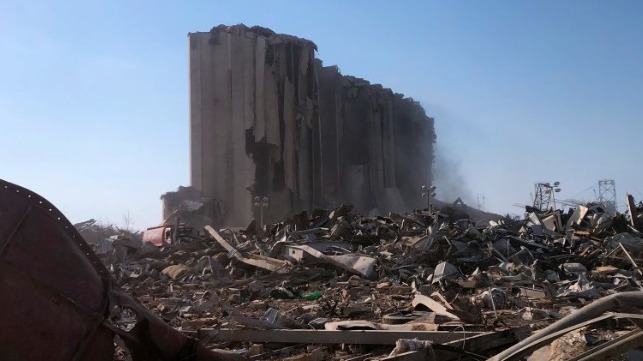Protesters Call for Justice on Anniversary of Port of Beirut Blast

On the first anniversary of the massive blast that rocked the Port of Beirut last year, thousands of citizens marched to the waterfront to demand accountability for the senior officials who are widely believed to bear responsibility for the explosion.
LIVE from the Port of Beirut where thousands and thousands of Lebanese citizens from across the country are gathering to remember and show that they haven't forgotten nor forgiven!!!!#BeirutExplosion #justice pic.twitter.com/4WMqj2t8RJ
— Fighters For Peace (@ffplebanon) August 4, 2021
The cxplosion of a poorly-stored cargo of ammonium nitrate killed more than 200 people and injured more than 7,000, leaving tens of thousands more without housing or work. Documents and testimony collected by Human Rights Watch suggest that "port, customs, and army officials ignored steps they could have taken to secure or destroy the material," many years before the blast. According to HRW, Ministry of Public Works and Transport officials were negligent in handling the cargo, and "knowingly stored the ammonium nitrate in Beirut’s port alongside flammable or explosive materials for nearly six years in a poorly secured and ventilated hangar in the middle of a densely populated commercial and residential area."
Stunning video shows explosions just minutes ago at Beirut port pic.twitter.com/ZjltF0VcTr
— Borzou Daragahi ???????? (@borzou) August 4, 2020
Further, Lebanon's security apparatus - including Military Intelligence, which was responsible for the security of munitions at the port - was allegedly aware of the cargo's danger but took little action, despite repeated warnings. Even after members of Lebanon's Higher Defense Council were appraised - including the interior minister, the director of general security, the prime minister and the president - little timely intervention occurred. Prime Minister Hassan Diab was allegedly informed of the risk as early as June 3, 2020, but he canceled a personal inspection of the port after an advisor told him that the cargo wasn't that dangerous, according to HRW. In an interview, Diab told Human Rights Watch, "I then forgot about it, and nobody followed up. There are disasters every day."
In a lucky twist of fate, theft and diversion may have reduced the impact of the massive blast. The cargo was stored unguarded in a hangar with a broken door, adjacent to the port's grain silo. Photos obtained by HRW and Lebanese investigators appear to show that some of the one-tonne bags of ammonium nitrate in the hangar were partially empty, and others were spilled, indicating the possibility of pilferage.
A recently-revealed FBI assessment of the blast estimated that 550 tonnes of ammonium nitrate - not 2,750 tonnes, the amount delivered and stored - had exploded on August 4, 2020. The FBI assessed that "it is not logical that all of [the one-tonne cargo bags] were present at the time of the explosion," suggesting that some of the cargo had gone missing and could not contribute to the strength of the explosion.
The investigation into the cause of the blast has slowed, and investigating judge Tarek Bitar's efforts to question high-level officials and politicians have run into resistance from the political establishment. The previous judge on the case, Fadi Sawan, faced accusations of political bias for attempting to question high-ranking officials, and he was ultimately removed from the case by two of the politicians he was investigating.
Bitar is finding traction in some parts of his investigation: on Friday, for the first time, Lebanese President Michel Aoun informed Lebanon's public prosecutor that he would be willing to give a statement to investigators about the circumstances behind the explosion.
